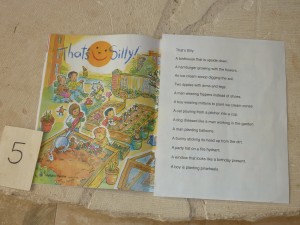Andrew has been getting the High Five magazine (the Highlights magazine’s version for younger children) for a few years now and he always had his favorite section that he’d flip to right away – Hidden Pictures. One day I was looking at it with him and we came across the “That’s Silly!†section and I began asking him what kinds of things were there that were silly. He only pointed to maybe one or two things and I was surprised. I pointed to something that was definitely not real and asked him if that was silly and he said, “No.” Was he looking at this picture as though everything in it made sense? Did he understand what “silly” meant? All sorts of questions ran through my mind and I needed to find out more about this!
Hmmm…perhaps this was another concept that I would have to be a bit more direct with and got an idea for how to do this. I got on my computer while looking at the “That’s Silly!†page and wrote a list of things for him to find.

I used this as a My Obstacle Course station activity and we would read the silly things for him to find, he would scan the picture to find it and we would say, “That’s Silly!†I would be able to see if he could find and recognize it within the picture. He didn’t need to be able to speak to show he knew this because he could point to it. We would then talk about why it was silly and didn’t belong. Once I got going, I also realized that by doing it in this way I was also helping to build language skills and vocabulary through my detailed descriptions.

It was an absolute hit with him and this soon became a favorite activity. One day, when the new issue came, he flipped to the “That’s Silly!” page and yelled out, “A squirrel eating an ice cream cone?!? That’s silly!â€

Why is this a big deal?
It is building reasoning skills so that he is able to distinguish things that are real and things that are not possible in the real world (non-fiction vs. fiction). Some things belong in certain situations or scenarios and some things do not. They can be combined to create funny stories and to act things out but I wanted him to know the difference. I was hoping that by providing him with some structure initially, telling him something he may have been thinking all along but just didn’t understand (for all I know he was sitting there thinking, “Hmmm…a mouse waiting in line at the Post Office.  Seems a bit odd but it is drawn on this picture so it must be true.”), that he would begin to recognize things that were out of place and be able to talk about why they didn’t fit.  These are just some basic skills that some children learn naturally and other children need them more spelled out. With Andrew, things need to be direct, not implied, and in this case “silly things” noted so he could begin to understand and process the rules the way his brain works.
It’s times and skills like this that remind me that building certain skills sometimes looks a bit different in our house but what matters is to start with the basics, be explicit with what the expectations are and what we are looking for, provide examples and opportunities to practice, sometimes more than typically developing peers, and that is ok! What matters is that he learns the same things as everyone else, just at his own pace.
Engage, Encourage and Empower